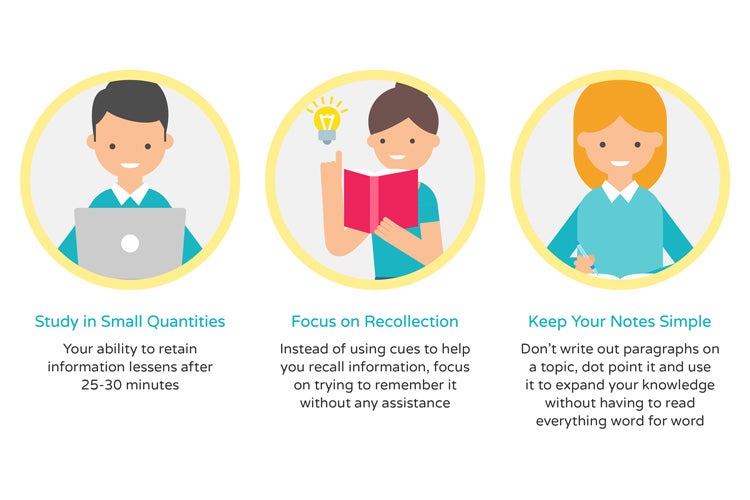Depending on where you’re studying, exams might be sneaking up on you every day, or they may still be a distant dot on the horizon. No matter when they are, it’s never too early to perfect your revision techniques. It’s not too outlandish to suggest that knowing how to study or revise is just as important, if not more so, than knowing what to study. We’ve scoured the web for the handiest study tips, and added a few of our own ideas for good measure to help you out when that dreaded time comes!
Before You Start
The most difficult part of any process, particularly one as terrifying as exam season, is sitting down and actually beginning. Speaking from a position of experience, don’t sit down with a jumbled series of notes the day before the big exam and expect it all to come flooding back! There’s plenty of study apps and planning and organising guides that can help you have all your notes prepared and organised, so when the time does come to knuckle down and get revising; you’ll be ready.
If you’re new to the game or returning to study as a mature aged student and need to refresh your study skills, this guide will help you with any assignment, report or group project you might face.
1. Start Early in the Day
Morning exams are the bane of many a student’s life, but many studies have shown that it’s the most efficient time of day to get moving and have that brain tick over. Not only is it considered the best time for committing information to memory; but it’s also a great way to wake up and get your mind switched on, helping you throughout the day with concentration and energy levels. Apply this to your revision, and voila, you’ll be well ahead of schedule by 3pm and feel much more awake to actually enjoy the rest of your day.
2. Know How To Study, and When to Stop
While there’s a variety of guidelines on the exact timings you should follow, the key idea is that controlled procrastination is essential to keeping your brain functioning at full capacity. According to Dr Marty Lobdell, the best way to study smart is to study less. Instead of dedicating hours and hours of relentless study without any breaks, he suggests following these rules:

3. Create a Clear Reward System
No matter what it’s for, we’re always more likely to perform better when we have a reward waiting for us at the end. Having something to strive towards and motivate us is the key to working hard. Whether it’s a well-deserved break, watching your favourite show or a chocolate bar just waiting for you in the pantry; rewarding yourself is worth it. In the long run, it’s also considered the best way to stop procrastination, improve retention and keep other distractions at bay.
4. Get Others Involved
There’s a reason people tell everybody their New Year’s resolutions, even if they rarely follow them through. Having others to support, motivate and encourage you through your study is a great way to keep focused and have others stop you from getting drawn in by temptations such as procrastinating, giving up or cheating your study schedule. If you’ve told your friends you’re studying for an upcoming exam and then ask them to go out for dinner; they’ll be more inclined to ask you whether you have time. Even getting you to question how your study’s going can get you to really consider whether you’ve done enough.
Having a study buddy is also a great way of using your time and can definitely be an effective way of studying. It’s important, however, to choose your study buddy wisely as the wrong one can upset your study efforts even more. There’s also been a number of studies that support learning and revising with others, as we typically don’t see socialising as a bad thing, so this tends to make us more inclined to be motivated to work harder.
So once you’ve got your revision schedule sorted, post it up in your kitchen, under the noses of your family or housemates. Their insistent questioning of your progress will motivate (and annoy) you much more than your own mind.

5. Teach Somebody Else
The difference in technique between teaching and studying is gigantic, yet there’s no better way to prove your understanding of the material than by walking a complete newcomer through it. Somebody without any prior knowledge will be excellent at identifying the gaps in your knowledge and ask the right questions to help you identify where to go from here.
Seneca, a Greek philosopher once said, ‘What We Teach, We Learn’, and this is scarily true. In what’s been dubbed the ‘Protegée effect’, students who spend time tutoring others, have been found to have much higher scores and test results than those who don’t. So why not test it out? Force a younger sibling, housemate or anyone really to listen to your lecture-style revision sessions, get them to ask questions about the topics and then use the knowledge you have to answer them in as much detail. This can also greatly improve your ability to answer questions on a test or exam.
Don’t have anybody to teach? Try your dog. He won’t ask any questions, but his look of general bafflement will inspire you to greater heights of understanding.
6. Listen to the Right Music
The silence of your bedroom or the library (only punctuated by ‘quiet’ whispering and coughing) isn’t actually too effective to revision. Some people love it, some people hate it. If silence drives you crazy, then this isn’t going to help you focus. Music that fades into the background, however, fills the gap and will help you through. Stay away from Rihanna and death metal (though, everyone’s different).
Instrument -based music, preferably anything without lyrics, is the best for study. Classical music has been proved to be the most successful music genre to listen to, with some studies showing that it can lead to higher scores on assessments and help with concentration, memory and even creativity. Check out YouTube playlists around ‘classical music to study to’ or have a look at this Top 10 Classical Pieces to help with study.

7. Relax
Most importantly, don’t get too stressed! Whether you chill out by socialising, hanging out with your cats or throwing yourself into Ashtanga yoga, staying relaxed and calm is the best method for staying focussed and thinking positive. Make sure you spend time properly relaxing too, not stressing about everything you need to remember and study for when you get home again. the best method is to work hard, then relax even harder. Let your brain work on cementing all that knowledge in the background.


